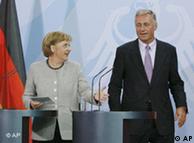European Union | 25.06.2008
German, Czech Leaders Optimistic About Lisbon Treaty
German Chancellor Angela Merkel and Czech Prime Minister Mirek Topolanek expressed optimism that the European Union reform treaty, the Treaty of Lisbon, would be ratified, despite the Irish "No" vote last week.
Topolanek said the parliamentary ratification process would continue once the Czech Constitutional Court had ruled.
"I am in any case an optimist on this question," Topolanek said.
Merkel responded: "If my Czech colleague is an optimist, then I am an optimist too."
Merkel, Topolanek and Slovak Prime Minister Robert Fico held talks in Berlin before attending a ceremony commemorating the Prague Spring 40 years ago, when the government of the then Czechoslovakia initiated wide-ranging reforms under Prime Minister Alexander Dubcek.
Fico said the Slovak government was strongly in favor of further EU enlargement.
"We completely support the idea of further EU enlargement, in particular for countries like Croatia and Serbia because we see the EU not only as a guarantee for good economic and social development but also primarily as a stability guarantee in this European region," the Slovak leader said.
Merkel and French President Nicolas Sarkozy have made clear that enlargement cannot proceed until the Treaty of Lisbon has been ratified by all 27 EU members.
Slovakia completed the ratification process last month, but the treaty faces a major hurdle in the Czech Constitutional Court. The Czech parliament has delayed the ratification process until the court rules.
In Germany, both houses of parliament have passed the necessary legislation, but President Horst Koehler is delaying his signature of assent until the German Constitutional Court has ruled.
Labor market also discussed
The three leaders referred to Germany's decision not to open its labor market to the new EU members from Eastern Europe, with Topolanek saying he saw it primarily as a "mental problem, a domestic political problem."
Fico said he placed great value on the free movement of labor in the EU, but each country had to decide on its own labor market course.
"We would welcome Germany's decision to open the labor market, but we do not see this as an absolute priority," Fico said.
Merkel, who was 14 at the time of the Prague Spring, recalled her joy at the opening up under Dubcek and the disappointment after the movement was crushed by Soviet-led Warsaw Pact forces in August the same year.

Comments